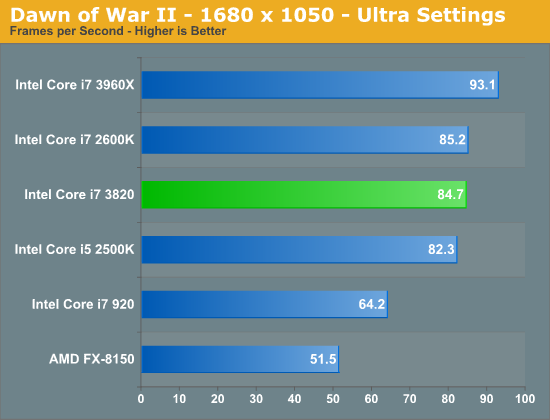Read the full article at:
https://www.techspot.com/review/492-intel-core-i7-3820/
Please leave your feedback here.
https://www.techspot.com/review/492-intel-core-i7-3820/
Please leave your feedback here.
What's bigger the CPU ID number or the system build price?I'm an AMD fan, but if I had to choose between the 2600k and the 3820 I'd go with the latter, because it's bigger.
Arris said:
Is it just me or does the tick(or tock, not sure which one this is) of Intel's tick/tock release schedule seem to be becoming less and less of an actual advancement?
Steve said:
We don't bother with non-realistic gaming settings anymore for these high-end CPU articles. Now we test closer to settings gamers are actually going to use and having said that at 1680x1050 the frame rates were still well over 60fps anyway. The gaming results only say what they need to, the processor makes bugger all difference, at least when comparing one high performance CPU to the next.
Also the games you mentioned are not “CPU-limited”, they are more CPU dependent than most games, that is not to say the CPU will be the bottleneck when using a high-end graphics card. Also you will find the The Witcher 2: Assassins of Kings to be just as CPU dependent as any other game out there...
https://www.techspot.com/review/405-the-witcher-2-performance/page8.html
Crysis 2 isn't bad either...
https://www.techspot.com/review/379-crysis-2-performance/page8.html
That really depends on what games are being tested, and if the system is GPU limited at the testing resolution/game IQThe reviewer says this new chip does OK and applications compared to a i7 920 but not in games?..[ ]...The 2600K barely outperforms the 920 (if at all) when talking games and this CPU isn't any different


So you play your games at the lowest resolution and graphical details?captain828 said:
...or at least drop those resolutions at the lowest setting and use the lowest graphical details to remove the GPU out of the equation.
As it stands, the gaming performance page doesn't say anything to me.
So you first say they aren't CPU-limited and then that they are more dependent of the CPU than most games.... doesn't that make them CPU-limited compared to other games?Steve said:
Also the games you mentioned are not “CPU-limited”, they are more CPU dependent than most games [...]
I agree with it as well, but when the results show a difference of maximum 20% between first place and last for 13 CPUs there's just not much to talk about.sarcasm said:
I actually agree with this methodology of testing only in real world scenarios.
If you posted just to insult, then you would have better not posted at all since I don't see anything constructive in your comment.Per Hansson said:
So you play your games at the lowest resolution and graphical details?captain828 said:
...or at least drop those resolutions at the lowest setting and use the lowest graphical details to remove the GPU out of the equation.
As it stands, the gaming performance page doesn't say anything to me.
Ok, I guess this review is not very enlightening for you then...
So you first say they aren't CPU-limited and then that they are more dependent of the CPU than most games.... doesn't that make them CPU-limited compared to other games?
I agree with it as well, but when the results show a difference of maximum 20% between first place and last for 13 CPUs there's just not much to talk about.
ArmA 2 OA - 10k distance, all maxed out @ 1080p. Try that and let me know how those CPUs scale.Steve said:
As I was saying no not at all. If you were using an Athlon II with a high-end GPU then yes certain games could be considered CPU limited. If you are using something like the Core i7-3820 or 2600K then no not so much
Not necessarily, but you should look for games that are going to tax the CPU more.So when the real world results are not exciting in future we should look for ways to make them exciting by using settings no gamer is ever going to use?
steve said:
To be fair, the i7-3960X isn't all that impressive when gaming either,
I'll think you'll find that Steve meant from a performance-per-dollar aspect. The 2 extra cores + L3 cache + tripled price tag over the 2500K/2600K don't translate into a significant real world gaming advantage. So while the 3960X/3930K are impressive in their own right, in relation to Intel's own mainstream platform of LGA 1155 it amounts to a neglible increase in performance at a higher cost of power consumption and overall platform cost...and that very slight increase in performance (in those cases where it does show) is offset by the 2500K/2600K/2700K's superior overclocking ability.You have to be kidding. This CPU chews through everything, including games. You make it sound as if there are way better CPU's available for gaming, when in fact that 3960X is one of the top performers.steve said::
To be fair, the i7-3960X isn't all that impressive when gaming either
For gamers there's very little to see here. The Core i7-3960X is no faster than the Core i7-2600K or even the Core i5-2500K.